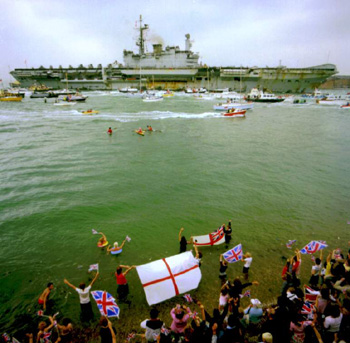CSPE Links
 Timor
Timor
 Cuba
Cuba
 Global Warming
Global Warming Africa I
Africa I  Argentina
Argentina  The Courts
The Courts  US Presidency
US Presidency  ASTI Strike
ASTI Strike  Attack
on America
Attack
on America
One of the most shocking aspects of the war was the sinking of the General Belgrano ship as it was leaving the British exclusion zone. Hundreds of Argentine soldiers died in the attack.


Thousands of British people crowded in the
large ports welcoming back the ships.
On March 20, 1982, Argentine citizens came ashore on South Georgia, a small island in the Falkland Island archipelago that encompasses some 200 small islands spread out between Argentina and the Arctic Circle. The Falkland Island archipelago, however, was British territory, and no one asked Great Britain's permission to land.
Thirteen days later, Argentine troops seized the two largest of the Falkland Islands under the rule of the President, General Galtieri. In response, Great Britain broke off diplomatic ties and sent a naval force south. The United Nations Security Council voted for a resolution demanding that Argentina withdraw its troops from the Falklands. Argentina "regretted" the U.N.'s decision, but held firm in its desire to possess the string of tiny islands. Eight days later, the British navy set sail and had established themselves between Argentina and the archipelago and declared a blockade against any Argentine ship that sailed within two hundred miles of the islands (the exclusion zone).
 This blockade effectively cut off the 10,000 Argentine troops on the islands. On May 2, 1982, the British began attacking the main Falkland islands. Despite negotiations, fighting continued until June 14 when Argentine troops surrendered. This was one of the finest moments of the British Prime Minister, Margaret Thatcher. Many believed the Falklands victory got her re-elected.
This blockade effectively cut off the 10,000 Argentine troops on the islands. On May 2, 1982, the British began attacking the main Falkland islands. Despite negotiations, fighting continued until June 14 when Argentine troops surrendered. This was one of the finest moments of the British Prime Minister, Margaret Thatcher. Many believed the Falklands victory got her re-elected. One of the most shocking aspects of the war was the sinking of the General Belgrano ship as it was leaving the British exclusion zone. Hundreds of Argentine soldiers died in the attack. The attack was widely condemned as a provocative act as the ship was sailing away. Thatcher defended the action strongly.
It also came to light later on that Pinochet, the leader of Chile, gave assistance to the British effort. Pinochet was a great admirer of Thatcher. Such assistance from a country close to the Falklands played an extremely important part in Britain's victory.
Wild celebrations popped up throughout England and people sang "Rule Brittania." Thousands of British people crowded in the large ports welcoming back the ships. It reawakened in the British a sense of patriotism that was last seen during World War II.
The conflict claimed 712 Argentine soldiers; Britain lost 255 people. However, the war debacle helped lead to the collapse of the military government, eventually ushering in elections and a new era of democracy for Argentina.


Evita

Maradona

Juan Peron